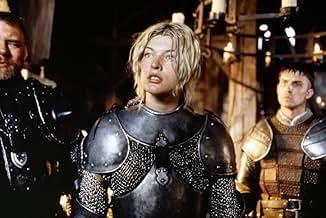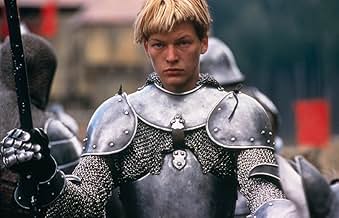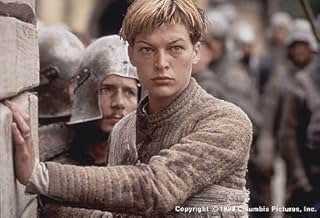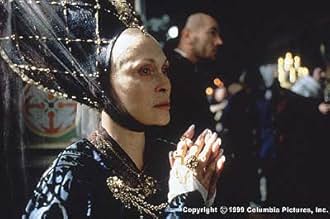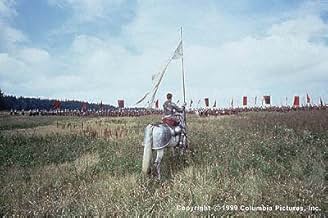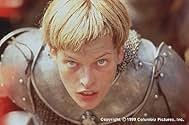L'epica e realistica descrizione del trionfo e della tragedia di Giovanna D'Arco. Una giovane donna di un remoto villaggio francese del xv secolo all'età di 16 anni, seguì il suo destino e c... Leggi tuttoL'epica e realistica descrizione del trionfo e della tragedia di Giovanna D'Arco. Una giovane donna di un remoto villaggio francese del xv secolo all'età di 16 anni, seguì il suo destino e cambiò il corso della storia. Per qualcuno fu un'eroina, per altri una santa, per altri anc... Leggi tuttoL'epica e realistica descrizione del trionfo e della tragedia di Giovanna D'Arco. Una giovane donna di un remoto villaggio francese del xv secolo all'età di 16 anni, seguì il suo destino e cambiò il corso della storia. Per qualcuno fu un'eroina, per altri una santa, per altri ancora un'eretica.
- Premi
- 5 vittorie e 13 candidature totali
- Look Out
- (as Stephane Algoud)
Recensioni in evidenza
The picture that Luc Besson made here deserves to be appreciated on its own merits. It is visually stunning, rousingly action-packed, and full of interesting period details. Yes, casting his supermodel wife Milla Jovovich in the lead was a risky choice, as her looks were hardly those of a typical medieval peasant. Yes, her performance did not resonate with the period the way one by a more classically trained actress might, although she was clearly never trying to be Ingrid Bergman. Still, Milla's hyperactive personality made her interesting and watchable as a historical person about whom so much has been written, who nonetheless existed so far back in the past that she lacks a strongly identifiable humanity. When somebody makes a better statue than a person, as Joan does from a contemporary viewpoint, odd casting choices can be forgiven if they work. Milla's twisty mannerisms, rolling eyes and whispery speech give the viewer constant occasions to ponder just how much of Joan's fanaticism came from genuine devotion to God and the church and how much was just an under-medicated personality disorder. This is actually one of the key scholarly issues surrounding Joan's life, and the picture brings it to the fore in its latter part as Joan herself tries to come to terms with her own claims of divine communication by means of a debate with Dustin Hoffman as her confessor-priest/conscience. That Besson takes no particular viewpoint here is an interesting choice, and one which actually helps the viewer to understand why Joan's story has compelled so many generations of historians.
The political aspects of Joan's life and legend were also dealt with in a nicely balanced fashion. Like many figures in times when political and national alliances changed with the seasons, Joan herself blew back and forth between being tremendously useful to the French throne at times and dangerously inconvenient at others. Fame is a powerful commodity at any time, and the picture carefully tracked the rise and fall of Joan's fortunes as she watched hers be manipulated, leveraged and ultimately put on trial.
I thought a lot of The Messenger and recommend it. Religious and historical scholars are advised to approach with caution.
I have to admit to putting myself in Jeanne's place, feeling what she must have been feeling along the way. I think without that, it probably would have been a much duller movie, although probably entertaining.
The battles scenes, of which there were many, were graphic and brutal. Dismemberments, swords and maces swinging, lots of pain and death. The ensuing desolation at the end of a battle were weighty and gave a a horrible look at the conditions of the time.
My final impressions... Joan of Arc, if the portrayals were accurate was a driven young woman, deeply religious and deeply confused who was probably at least partially insane. If she were alive today, no doubt, she would be treated with common drugs and would lead a normal life. I felt very sorry for her and her situation and for the way that she was treated. I know people would argue that there is no need to feel this way, because she was clear and sure of her purpose. I don't feel that this was ever the case and she was sure only that she was going crazy if she didn't do something.
Movies don't usually move me this way and I'm really amazed.
There really was a very religious young girl who was considered a savior to France during The Hundred Years War. Although things may have eventually sorted themselves out the same way without her. Three years after her birth, the new tactics of the English archers were responsible for arguably the most one-sided battle in military history at Agincourt. The result was credited to Henry V's piety and he got a great passage in Shakespeare. The French aristocracy was almost wiped out by the battle and the English became solidly entrenched in France. Fourteen years later a new generation of French nobility was beginning to assert itself and it was the English and their French allies who were having leadership problems.
Both countries were Catholic at the time and both claimed that God was on their side, a bit like the football player who thanks God for the victory over another team that apparently God did not favor.
Although there are records of both of Joan's trials (her Condemnation Trial and her Rehabilitation Trial) both proceedings had their own political agenda and should be taken with a grain of salt. Besson's film seems to follow the generally accepted version of the story but takes obvious liberties with Joan's mental condition and visions. There is no way to prove or disprove any of this so it is probably as plausible as any other speculation.
What hurts "The Messenger: The Story of Joan of Arc" is that Besson's best scenes are at the very beginning and set too high a standard for the remainder of the film. Jane Valentine is wonderful as the young Joan and Besson shows that his directing skills with young actors was not confined to Natalie Portman's performance in "Leon". This early stuff features some of the most interesting scene juxtaposition that you are likely to see in any film. IMHO it gets off to a better start than any film in cinema history. And the sequence where the young Joan is standing on a hill watching as the English burn her village is as visually stunning as anything ever filmed.
But once Milla Jovovich's grown-up Joan takes over most viewers will find it difficult to stay focused on the story. It's not miscasting, Jovovich is noted for aggressive and daring performances (see "The Dummy") rather than subtlety and nuance, making her a good fit for the take Besson wanted on Joan's personality. The problem is that while a viewer could identify with the young Joan, the older Joan is just repellent. Her story should be inspirational and tragic. Instead it is a bunch of comic book battle scenes and comical melodrama.
But it is worth watching for the production design and the beginning sequences.
Then again, what do I know? I'm only a child.
So I popped this flick in the DVD player not expecting much. Sacrée merde! What a surprise. It seems, stripped of her futuristic-mutant-motorcycle-riding-vampire persona, she's really quite good. This film--probably the least glamorous of her entire repertoire--really gives her a chance to show her full dynamics. I can't say much more without giving away the plot, so I'll drop it for now.
Now on to the director Luc Besson. For the first half hour or so, he seems to suffer from "I wanna be Kenneth Branagh" syndrome (which is almost as painful as the avian flu). We get a dozen scenes of someone running down a corridor with the camera chasing behind. We get a dozen overhead-camera-twirly shots of someone lying on the ground. We get so many crane shots, you start thinking you're on a construction site. What's wrong with all this? I'll tell you. When the camera swings & sways too much it detracts from the actors' performances. Sure it adds visual drama, but so can a good fireworks scene (with just as much subtlety).
But suddenly, right around the halfway mark, the camera man simmers down. The whole tone of the film changes, becomes darker and more intense, relying on the power of the actors instead of the gimmicky camera-work. This works brilliantly, especially when Dustin Hoffman finally steps in.
This is the break that takes the movie in an entirely different (and possibly offensive) direction. It looks like some IMDb reviewers weren't too happy. I'm sure plenty of others got bored (because the swordfights stop). But me, I thought this change of mood was what made the movie. Suddenly it becomes a spooky, psychological thriller with a lot of great dialogue and a ton of good acting. THIS is the payoff.
My biggest gripe with the movie is that after seeing the 2nd half, I kept saying to myself "why the hell did Besson waste so much time getting here?" There were a few too many insignificant fluff scenes in the beginning (like the virginity test lol) that should have been replaced with more of the powerful Milla-Dustin dialogue toward the end.
I won't comment on historical accuracy, religious sacrilege, lack-of-realism or the fact that there were a few too many American accents for 15th century France. These flaws fall by the wayside if you're instead paying attention to the complex conflict brewing in Milla's character. This is really her movie, and a damn good one at that. Like my title implies, it's good enough to make me want to give Ultraviolet another try.
Joan was, of course, the deeply religious teenage girl who lead Prince Charles' army to improbable victory over the invading English at Orleans and helped re-consolidate French sovereignty. Joan considered herself God's appointed messenger, and France apparently saw her as an avenging angel. Today, she is commonly regarded as a schizophrenic. She was canonized in the 1950s, 500 years after her death. Regardless of whether God or insanity was the source of her strength, power, will and incredible courage - there is little ambiguity about her role in the salvation of France nor the fate that awaited her afterward.
In general, the acting is quite good. Jovovich's much-maligned performance is actually very good and exactly appropriate for what Besson was trying to do with the film. Comparing Joan of Arc to her other Messianic role as Leelu in the Fifth Element is, frankly, ridiculous. I believe that the problems people find in Jovovich's performance are problems those same people bring to the film. Malkovich and Dunaway are phenomenal. Tcheky Karyo and Vincent Cassell provide excellent support.
Besson strays from what we think we know about the details of Joan's story, but only to present the truth of the big-picture more accurately. His film steadfastly refuses to answer the questions many people will bring to it:
* Was Joan schizophrenic? * Was she a catholic messiah or divinely inspired prophet?
Why is Besson so careful about accurately presenting the ambiguity of the story? I think he wanted to make a moving film, but not a film which would unsubtly challenge its audience's beliefs. If you do not believe, you will tend to explain Dustin Hoffman's character as a manifestation of Joan's psychological problems. If you do believe, you may want to think of him as Satan, am angel, perhaps both. Thus, Besson, who is a deeply spiritual person, makes a powerful statement about faith through his metanarrative while maintaining an appropriately unevangelical position. He took similar paths in his more uplifting films The Fifth Element and Angel-A.
Highly recommended for Besson and Jovovich fans. Not a biography - avoid this if you must have the "plain" facts! Mildly recommended as a piece of historical fiction.
Lo sapevi?
- QuizMost of the characters, including Joan's Captains, were real people. Giles de Rais was a real person who, after the war and Joan's death, retired to his lands. Many years later, he was arrested for the murder of more than 100 young boys, and executed. Some historians believe that his crimes were the basis for the French fairy tale "Bluebeard," about a rich man who murders his wives and hides their bodies in his grand house.
- BlooperJoan's older sister was not murdered by soldiers, but survived to adulthood and married. She died ultimately in childbirth.
- Citazioni
Joan of Arc: I've always been faithful to God and I've followed everything He's ever said and I've done everything He's ever asked me to do.
The Conscience: God asked you to do something?
Joan of Arc: Yes. Yes, lots of things.
The Conscience: You mean God said, "I need you, Jeanne."
Joan of Arc: No. But He sent me signs.
The Conscience: Signs? What signs?
Joan of Arc: The wind. The wind. And the clouds, ringing!
The Conscience: Ringing clouds?
Joan of Arc: The dance. The dance. The dance. The dance.
The Conscience: The dance.
Joan of Arc: The sword! The sword lying in the field. That was a sign.
The Conscience: No. That was a sword in a field.
Joan of Arc: No. No, that was a sign!
The Conscience: No. That was a sword. In a field.
Joan of Arc: It can't just get there by itself! It can't. A sword just doesn't get there by itself. It can't just get there by itself.
The Conscience: True. Every event has an infinite number of causes, so why pick one rather than another? There are many ways a sword might find itself in a field.
- Versioni alternativeThe European release was 10 minutes longer than the US theatrical version, which omits, among others, the scene where Joan's virginity is tested before the court of King Charles VII. The longer version has been released in the USA on DVD.
- Colonne sonoreMy Heart Calling
Lyrics and Music by Éric Serra and Achinoam Nini
Produced by Éric Serra
Performed by Achinoam Nini
With the Special Authorization of Interscope/Geffen
I più visti
- How long is The Messenger: The Story of Joan of Arc?Powered by Alexa
Dettagli
- Data di uscita
- Paesi di origine
- Lingue
- Celebre anche come
- Juana de Arco
- Luoghi delle riprese
- Bruntal, Repubblica Ceca(Fort of the Tourelles)
- Aziende produttrici
- Vedi altri crediti dell’azienda su IMDbPro
Botteghino
- Budget
- 85.000.000 USD (previsto)
- Lordo Stati Uniti e Canada
- 14.276.317 USD
- Fine settimana di apertura Stati Uniti e Canada
- 6.360.968 USD
- 14 nov 1999
- Lordo in tutto il mondo
- 66.976.317 USD
- Tempo di esecuzione2 ore 38 minuti
- Colore
- Mix di suoni
- Proporzioni
- 2.39 : 1
Contribuisci a questa pagina




